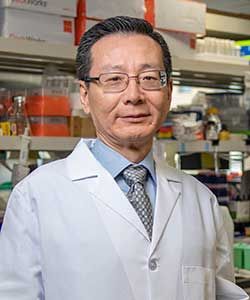
As Department Chair, I welcome you to the Department of Biochemistry and Molecular Medicine Homepage. We are a basic science department with a lustrous history of academic excellence in research and education. Our overarching goals are to elucidate molecular mechanisms underlying health and disease-related biological processes through innovative and collaborative research, to educate medical, undergraduate and graduate students in the areas of biochemistry, molecular genetics, genomics, and bioinformatics, and to train future generations of leading scientists with critical thinking and analytical skills.
As the Department has reached its centennial anniversary, we are profoundly proud of the exceptional scientific accomplishments of our past and current faculty and their research teams. Just to name a few. Dr. Vincent du Vigneaud, a former department chair, received the 1955 Nobel Peace Prize in Chemistry for the first synthesis of oxytocin. Dr. Allan L. Goldstein, a former department chair, co-discovered (with Abraham White) the Thymosins, a family of hormone-like peptides that play important functions in the immune system, the neuroendocrine system, and the brain. Dr. Ferid Murad, a former faculty member, received the 1998 Nobel Peace Prize in Physiology/Medicine for his pioneering work on nitric oxide. Dr. Ed Seto, currently Associate Director for Basic Sciences at the George Washington Cancer Center, is internationally renowned for his pioneering work on the roles of histone deacetylases in epigenetic regulation. The bioinformatics-based research team led by Dr. Raja Mazumder is at the forefront of developing multiple data-analysis tools and standards for bioinformatics communication, and knowledgebases in glycoinformatics, cancer research, and microbiome analysis. Ongoing research in the Department is generously supported by the Catherine B. McCormick Endowment that augments research activities and provides bioinformatics assistance. Please see our department history, Bioinformatics Core, and individual faculty/lab page for more research activities.
Built upon our past accomplishments and the current research expertise in the Department, we are eager to expand our programs and achieve more cross-pollination and scientific synergy among the existing research themes both in and outside the department. The Department is housed in the same research building as the other basic science departments at the SMHS, including the Department of Anatomy & Cell Biology, the Department of Pharmacology and Physiology, and the Department of Microbiology, Immunology & Tropical Medicine. The physical proximity and highly collegial culture of the local research community have been a tremendous impetus to inter-departmental collaborations and programmatic development. In addition, our institution’s close location to the NIH, Children’s National Health System, and other institutions in the Washington DC metropolitan area provides outstanding opportunities for collaboration. Opportunities are also available to collaborate with colleagues in the George Washington University Cancer Center. Finally, our ongoing new faculty recruitment will complement the existing scientific strength and further enhance an integrated role of our department in addressing major health- and disease-related challenges through innovative multidisciplinary research.
Organically coupled to our research endeavors is our longstanding education mission and commitment to training the next generation of leading scientists. Our PhD training is an integrated component of the Institute of Biomedical Sciences (IBS) at the School of Medicine and Health Sciences. In addition, the MS program in Bioinformatics and Molecular Biochemistry provides an excellent training venue that meets the rapidly growing needs of biomedical research especially in the areas of data science. We welcome highly motivated pre- and postdoctoral trainees who aspire to innovative research under rigorous mentorship in a caring and intellectually stimulating academic environment. I encourage you to learn more about our education programs and training opportunities at the MS, PhD, and postdoctoral levels.
Our department and the George Washington University School of Medicine and Health Sciences are located at the heart of Washington DC. It is one of the most vibrant parts of the city with convenient public transportations (Metro and bus stops are right outside our laboratory building) and unparalleled cultural and historical ambience. The International Monetary Fund and the World Bank are located on the GWU campus and the White House and the Kennedy Center for the Performing Arts are within blocks of the campus. Both geographically and culturally speaking, our department is centrally and ideally situated to improve health through innovative research and to foster scientific progress at the local, national, and global levels. Please do not hesitate to contact us with any comments and inputs.
Rong Li
Professor and Chair